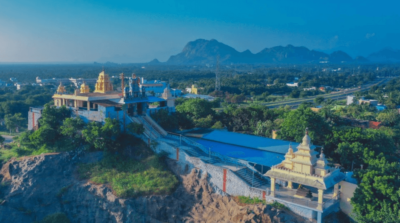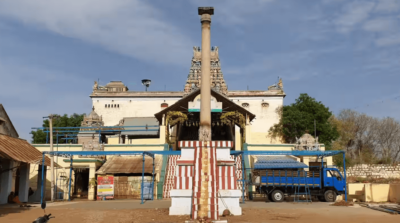Arulmigu Kuzhandhai Velappar Thirukkovil
Poombarai Murugan Temple, also known as Kuzhanthai Velappar Temple, is a revered Hindu temple located in the picturesque hill station of Poombarai, nestled in the Kodaikanal hills in Tamil Nadu. This temple is dedicated to Lord Murugan, known here as Kuzhanthai Velappar, which means “Child Murugan with the Vel (spear).” The temple is an important spiritual site, attracting devotees who come to seek the blessings of Lord Murugan for health, prosperity, and protection.
History and Legends
- Antiquity: The history of Poombarai Murugan Temple dates back approximately 3,000 years, making it an ancient place of worship. The original idol of Kuzhanthai Velappar is believed to have been consecrated by the great Tamil saint and poet, Bogar, a Siddhar who was well-versed in alchemy, medicine, and spirituality.
- Bogar’s Influence: According to legend, Bogar, who is also associated with the famous Palani Murugan Temple, crafted the idol of Lord Murugan using a special medicinal herb mix known as “Navapashanam.” This sacred substance is believed to have healing properties. The consecration of the idol by Bogar adds to the temple’s spiritual and historical significance.
The Deity – Kuzhanthai Velappar
- Form of Murugan: The temple’s main deity, Kuzhanthai Velappar, depicts Lord Murugan as a child holding a Vel, symbolizing purity, divinity, and protection. The image of the youthful Murugan resonates with devotees, who see him as both a guardian and a loving divine child.
- Healing Powers: Devotees believe that the deity possesses special healing powers, particularly for children who are suffering from illnesses. Prayers and offerings are made to Kuzhanthai Velappar for the well-being and health of young ones.
Location
- Location: The temple is situated in Poombarai, a charming village located about 18 kilometers from Kodaikanal, at an altitude of around 1,920 meters (6,300 feet) above sea level in the Western Ghats. The area is known for its lush greenery, terraced farms, and serene surroundings.
- Scenic Beauty: The temple’s hilltop location offers stunning views of the surrounding valley, terraced fields, and dense forests, creating a tranquil atmosphere that enhances the spiritual experience for visitors.
Festivals and Rituals
- Thaipusam: Thaipusam is one of the major festivals celebrated at Poombarai Murugan Temple, attracting a large number of devotees. The festival marks the occasion when Goddess Parvati gave the Vel to Lord Murugan to vanquish the demon Surapadman. Devotees carry “Kavadis” and perform special rituals seeking Murugan’s blessings.
- Panguni Uthiram: Another significant festival, celebrated during the Tamil month of Panguni, commemorates the celestial wedding of Lord Murugan and Deivanai.
- Special Poojas and Offerings: Regular poojas are conducted in the temple, and special prayers are often held for children and for those seeking relief from ailments.
Architecture
The temple features traditional South Indian temple architecture, with a simple yet elegant design that reflects the natural beauty of its surroundings. The sanctum sanctorum houses the main deity, and the structure includes a mandapam (hall) where devotees can gather for worship.
Cultural and Spiritual Significance
Poombarai Murugan Temple is not just a place of worship; it also serves as a cultural center for the local community. The temple plays a significant role in preserving and promoting Tamil cultural traditions, as it is intertwined with local customs, folklore, and spiritual practices.
The Poombarai Kuzhanthai Velappar Temple, set against the stunning backdrop of the Western Ghats, stands as a testament to the enduring faith in Lord Murugan, offering solace and blessings to all who seek divine grace amidst nature’s beauty.




